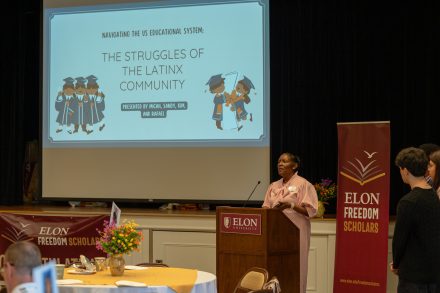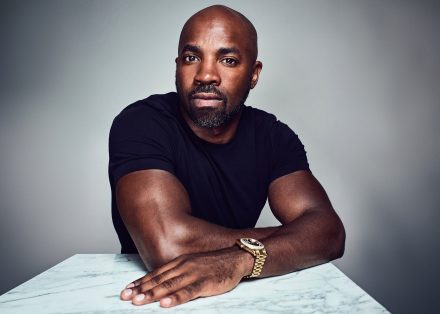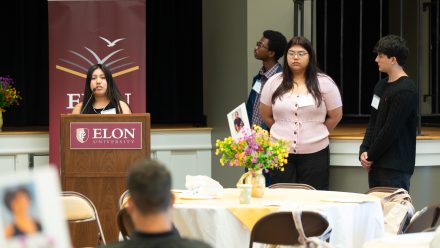The Elon Freedom Scholars is one of several university college access programs, launched in 2022. This summer, the second cohort of the program celebrated their civic engagement research and initiatives at their annual Symposium, inspired to find their purpose and better their communities.
Growing up, Chris Wilson says people were hard on him, always pushing him to do more and make a difference. After a life of adversity, including 16 years in prison, Wilson is making that difference and urging Elon University’s Freedom Scholars to do the same.
“I believe that we all have a purpose in life,” said Wilson, the keynote speaker at the second Elon Freedom Scholars Symposium on June 11. “I believe that if we all understand that self-agency can really make a difference in our lives, the world will be a better place.”
Freedom Struggles
The Freedom Scholars Symposium in Moseley Center offered an opportunity for the second cohort of Freedom Scholars to celebrate their hard work and present their civic engagement projects. The Elon Freedom Scholars is one of several university college access programs, launched in 2022. The program partners with The Teagle Foundation’s “Knowledge for Freedom” initiative and supports local high school students from underserved populations to be difference makers in their communities.

This year, 15 Alamance-Burlington School System high school students participated in the program which included a two-week, intensive residential experience and monthly programming throughout the academic year. In that time, the Freedom Scholars worked with a mentor in their area of expertise to deepen their understanding of the challenges they want to address. The theme of the 2023-24 Freedom Scholars Symposium was “Freedom Struggles.”
“Locally, nationally, globally, we are in a battle for democracy, citizenship, freedom,” said Prudence Layne, director of the Freedom Scholars and associate professor of English. “We really hope that the symposium audience, in a local context, can see the work that our students have put in, how civically engaged they are and think about their roles in meeting the challenges that are ahead of us.”
The Master Plan
Struggling for freedom is something keynote speaker Chris Wilson is all too familiar with. During the 1980s and 1990s, Wilson grew up in a Washington, D.C. community plagued by violence. Amid ducking to the ground in his grandmother’s home to avoid gunfire, his family also suffered extensive stalking and abuse from his mother’s ex-boyfriend. It all culminated in being sentenced to life in prison for killing a man at the age of 18.
“I fell into a deep depression. I was withering for about two years,” said Wilson of his time in prison. “I couldn’t believe my life was over and I had to grow old and die in this place.”

But then Wilson came across another inmate who was studying every day to eventually get out and start a software company. “This is how I will be free,” he told Wilson.
It was a spark. Wilson began writing his “Master Plan,” a list of things he wanted to accomplish. The most important item on the list: to be free.
“When I was writing my Master Plan in my cell, I said I would like to be the person who goes back into communities [like my own] and lift my people out of this figurative cave and show them how to fill out a job application or how to start a business. I want to live by example.”
In 2006, after more than 16 years in prison, a judge granted him a second chance and he was a free man. Now a visual artist and social justice advocate, Wilson started The Chris Wilson Foundation to provide support to “justice-impacted individuals who struggled with the same barriers to opportunity, education and employment that he did.” He also published a book, “The Master Plan: My Journey From Life in Prison to a Life of Purpose,” that helped inform this year’s Elon Freedom Scholars cohort.
Freedom Scholar Mram Elhussain, who recently graduated from Western Alamance High School, presented Wilson with the Elon Freedom Scholars Speaker Award noting that his focus on community in his work made a strong impact on her.
“This program really puts a significance on community as well,” said Elhussain. “Reading how Wilson not only tried to better himself and later in his community has inspired me in ways that I cannot begin to describe.”
Food For Thought
During the symposium, the Freedom Scholars presented their work from the program – each focusing on a different civic engagement topic. Sandy Orozzo Rosado, a Williams High School graduate who will be a member of Elon’s Class of 2028, and her group explored the challenges that first-generation Latino immigrants face when pursuing higher education. The group held a “Food for Thought” event where they listened to the experiences of current Elon students. Some of the challenges they heard included access to Spanish language support, career guidance and dual enrollment courses.

“I took a dual enrollment course with Elon and one of the classes I took was an upper 3000 Spanish course and I’d previously only taken AP Spanish,” said Orozzo Rosado, an incoming Odyssey Program scholar. “The attention that I received was super considerate and they gave a lot of constructive feedback. It was a life-changing course.”
The group also created an infographic sheet with resources for first-generation Latino students, hoping to make them available at the CityGate Dream Center in Burlington and in local middle and high schools. Other Freedom Scholars projects included issues facing underprivileged schools, diversity in LGBTQ+ spaces and the limitations of agricultural education in city schools.
All of this year’s Freedom Scholars will be attending college, including at Duke, UNC-Chapel Hill, UNC-Charlotte, Virginia Tech and Elon. The next cohort of Freedom Scholars will be integrated with Collegiate Start@Elon, a dual enrollment program for high school seniors, allowing the students to take up to eight credit hours in Fall 2024 and Spring 2025.
“I am happy with how things turned out with this cohort,” said Layne. “We really hope that our students continue to stay engaged. What I’ve loved about the first two iterations of the program is that, for some of their civic engagement projects, they’re already thinking about how they can continue them.”


